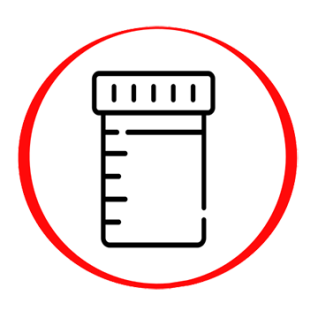
Qualitative Detection of Roto, Noro, and Adeno Virus Antigens in Stool
20.00€
The validity period of online orders: 3 months from the purchase date.
The laboratory test “Qualitative Detection of Roto, Noro, and Adeno Virus Antigens in Stool” is an important diagnostic tool that helps identify infections caused by these viruses. This test is performed by analyzing stool samples and is extremely useful in assessing the condition of the digestive tract and the prevalence of infections in the human body. Roto, Noro, and Adeno viruses are the most common causes of viral infections, especially in children, making this test significant for both individual and public health control.
Purpose of the Test
The main purpose of this test is to determine whether there are antigens of Roto, Noro, and Adeno viruses in the human body. These viruses can cause gastrointestinal infections, most commonly manifested as gastroenteritis. By identifying the presence of these viruses, diseases such as acute diarrhea, vomiting, and abdominal pain, often occurring in children's groups and potentially leading to dehydration and other complications, can be diagnosed. The test is recommended when there is suspicion of viral intestinal infections, especially during epidemics or when symptoms appear.
Symptoms and Indications
Doctors may recommend this test if the patient experiences symptoms such as sudden diarrhea, vomiting, abdominal pain, fever, or fatigue. The test may also be prescribed as a preventive measure if a person has been in contact with an infected individual or while traveling to regions where these viruses are prevalent. Additionally, the test may be beneficial for pregnant women, children, or individuals with weakened immune systems to prevent potential complications.
Test Procedure
The test is conducted by collecting a small amount of stool sample, which is then analyzed in a laboratory. The patient does not need special preparation for this test, but it is important to follow the doctor's or laboratory's instructions for sample collection and storage. Results are usually ready in a few days, depending on the laboratory's capacity.
Interpretation of Results
The test results indicate whether there are antigens of Roto, Noro, or Adeno viruses in the stool. Positive results indicate the presence of an infection and require consultation with a doctor for further treatment planning. Negative results often mean that there is no infection, but if symptoms persist, repeat testing or additional diagnostics may be needed. Results can be transient and depend on the stage of infection or immune status.
Health Significance
This test is important not only for diagnosing viral infections but also for preventing their spread and complications. Timely detection of an infection allows for effective patient treatment and protection of others from potential infection. This is especially significant in educational institutions, hospitals, and other places with a high concentration of people. Thus, the test contributes to improving public health and controlling the spread of infections.
In summary, the “Qualitative Detection of Roto, Noro, and Adeno Virus Antigens in Stool” is a valuable diagnostic tool that ensures timely diagnosis and effective treatment, thus avoiding more serious health issues.

Reference: 16156
20.00€






